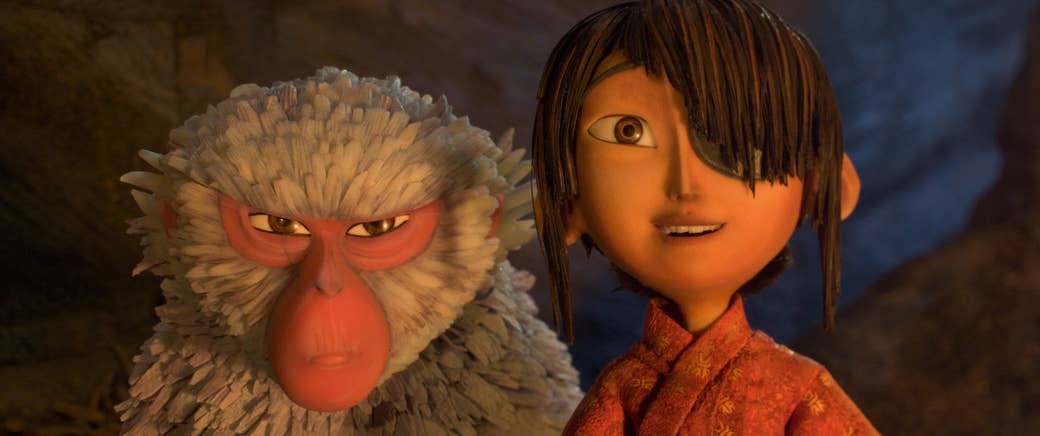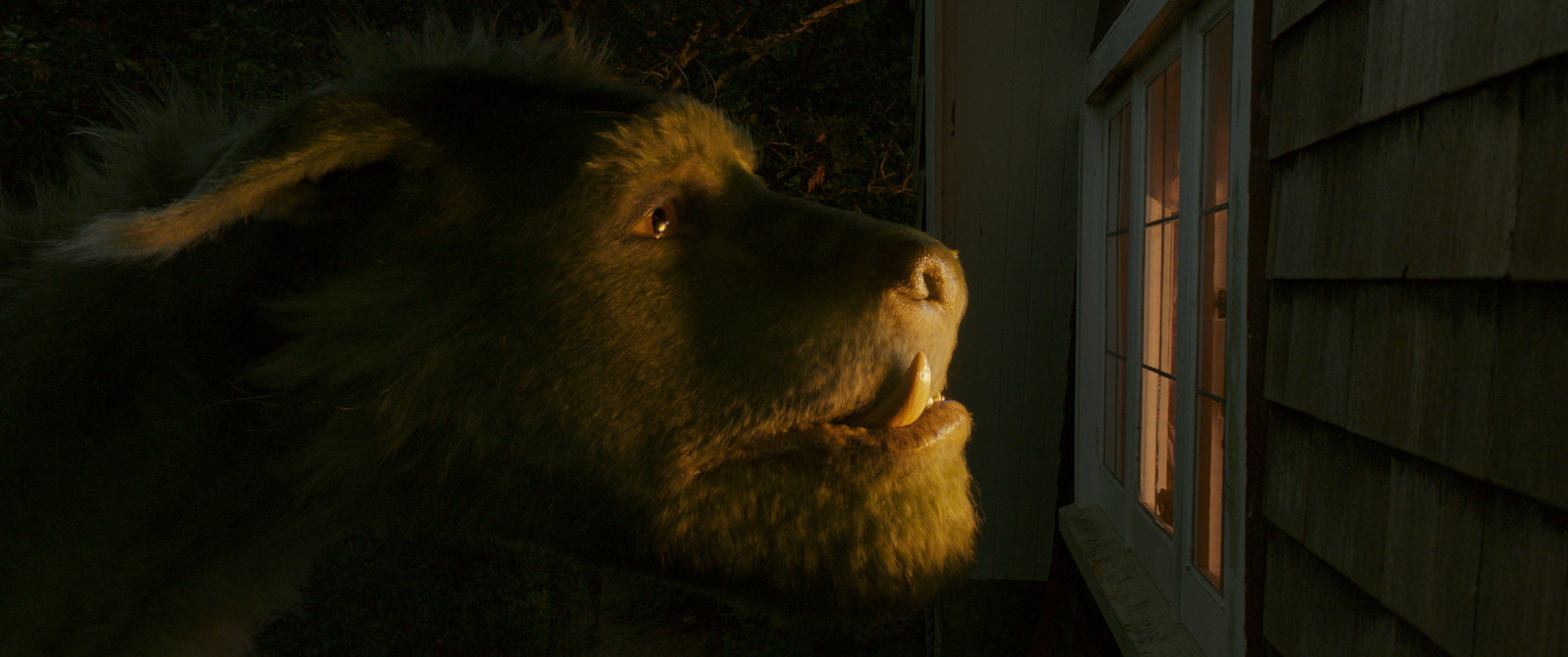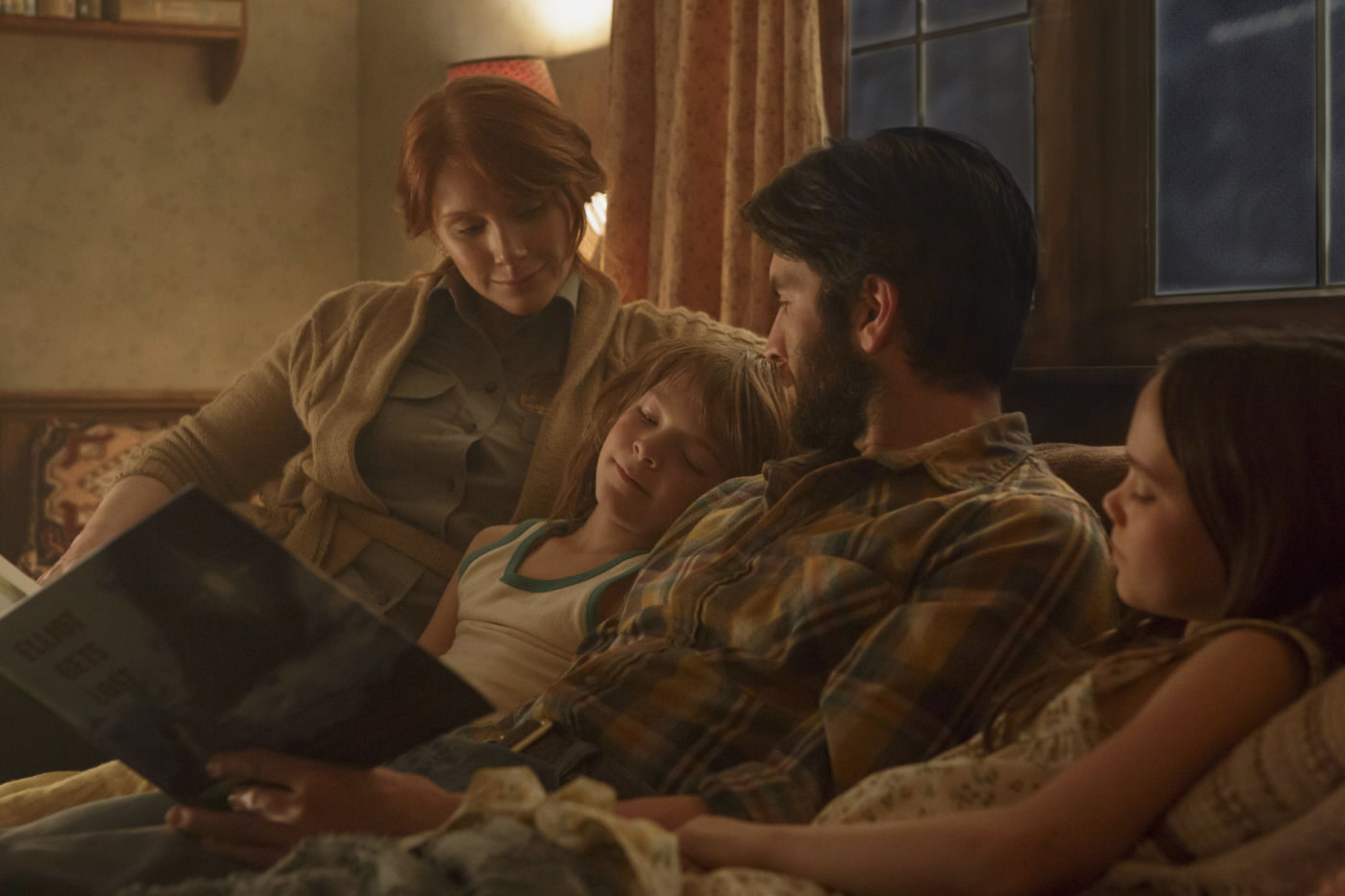
Kubo and the Two Strings just might be the most ambitious and sweeping stop-motion movie ever made, a fantasy set in a mythical past Japan steeped in magical potential and gratifyingly free of any queasy hints of Orientalism (though not, alas, from whitewashing). It’s a land in which a carved wooden monkey can come to life and serve as the brusque companion of a shamisen-wielding boy whose burgeoning powers include the ability to breathe life into paper figures. Its imagination, boosted by the folklore from which it draws, feels boundless: It stretches for the horizons, flinging its characters into the sky on spectral dragonfly wings and sending them plunging into the depths of a lake where glowing-eyed monsters grow out of the sediment like seaweed. It’s so stunning that it’s easy to forget it’s stop-motion at all, until the film zooms in on the characters and the solidity of their carefully detailed faces, the lanky strands of their hair or ruffles of their fur, and the texture of their clothing becomes clear. They are not infinitely mutable computer-generated creations existing only in the digital ether. They have heft as well as the limitations that come from an analog existence as physical forms.

It’s form matching content, since the story of Kubo and the Two Strings is actually all about the worth of limitations, both in terms of human lives and in terms of storytelling coming with endings. They’re ideas so unhip these days, in an era of the endless possibilities of CGI and franchises that go on until audiences stop turning up, that watching the film, you can start to feel protective of its delicate daring. There’s an earnestness to it that feels like it could be as easily crushed as one of the puppets used in its making. Kubo is the fourth film from the Portland-based Laika — a studio specializing in stop-motion that has turned out features ranging from the solid (2014’s The Boxtrolls) to the sublime (2009’s Coraline) — and the first to be directed by the company’s CEO, Travis Knight. Compared to animation giants like Disney, Pixar, DreamWorks, and Illumination, Laika is an underdog shop turning out underdog fare that is made differently and stands apart from the average children’s release — darker, quirkier, more handmade, using a stop-motion approach that somehow inevitably feels a little melancholy in its painstaking nature. Kubo and the Two Strings is (the word is inescapable) dazzling, but it’s not topical and it’s not slick, even in the midst of a sword fight on a splintering ship made of leaves bound together by an enchantment. Its sense of wonder is legit and hard-won.
This year’s already seen worthy children’s movies — like Zootopia, in which a talking animal buddy-cop movie is used as a cover for explaining racial bias, or Finding Dory, in which an amnesiac fish sidekick with a tragic backstory gains the empowerment of being a protagonist. No one would deny that a film made for kids can still be capable of thematic and emotional depth, even if audiences are just as happy to turn up to 90 middling minutes of inoffensive adorableness like The Secret Life of Pets. But we still often look at ambitious, adult themes as being Trojan-horsed into children’s films, snuck in under the cover of bright busyness, hidden in screens already crammed full of action as if it were a trick.
Kubo and the Two Strings isn’t trying to get away with anything, wearing its faith in its storytelling on its tattered sleeve. Its plot is an adventure of classical definitions, its title character a one-eyed boy (voiced by young Irish actor Art Parkinson) who has a talent for animation himself, capable of using magic to fold paper into origami figures that can be brought to life. The product of the forbidden romance between a warrior and a sorceress, he’s soon forced to go on the run from his mother's vengeful celestial relatives as he searches for a set of mystical armor. Kubo is joined by two sidekicks: a stern figurine-made-real, Monkey (Charlize Theron), and a ditzy, slightly less well-conceived warrior bug, Beetle (Matthew McConaughey). The film pays homage to the past for touchstones like a legendary samurai modeled on Toshiro Mifune and a towering skeleton emerging from the dark like a Ray Harryhausen nightmare.
Kubo contends with a set of trials and learns some truths about his parents that turn out to be more important than any armor. He faces his pair of masked witch aunts in high-fashion villainess outfits (both voiced by Rooney Mara, in a role that’s almost too on-brand) and his menacing grandfather the Moon King (Ralph Fiennes), all of them immortals who have contempt for connection and vulnerability. Given the potential to become a cold, eternal god versus remaining a human capable of love (and the loss that comes with it), Kubo is firmly on the side of humanity, but it’s a choice the film doesn’t leave in the abstract. It’s triumphant as well as terribly sad, and that sadness is something that isn’t resolved with a miraculous save, but instead is allowed to resonate. Loss becomes as essential to the finale as victory. In the age of sequels and revivals, in which everything and everyone has the potential to come (or be walked) back, the way Kubo and the Two Strings dwells on the finite feels like a bold statement about what young audiences can handle, and about what the purposes of storytelling are.

Kubo and the Two Strings is the best children’s movie of the year, and the way that it feels overshadowed by doom in an unpredictable box office season may be just cynicism, or may speak to the now-requisite marketing bullet points it doesn’t check off: It’s not cute, it doesn’t have an easily elevator-pitched concept, and it’s not based on an already familiar property.
Then again, Disney’s Pete’s Dragon hasn’t proven to be a breakout hit either. Unlike Kubo, it’s (loosely) inspired by an old property, a 1977 musical oddity that may not be a stone-cold classic but has stuck around in the collective memory enough that you’d think it’d get a nostalgia boost. The Pete’s Dragon remake is directed by indie filmmaker David Lowery, who’s given the tale of an orphaned boy and his magical pet a soulful revamp that, like Kubo and the Two Strings, feels out of step with what’s become the standard tone of a kids' film. That’s not a bad thing. Its hero, Pete (Oakes Fegley), lives alone in the forest with his green, fire-breathing, occasionally invisible companion for years, until an encounter with a logging company puts him in the company of ranger Grace (Bryce Dallas Howard), her fiance Jack (Wes Bentley), Jack’s daughter Natalie (Oona Laurence), and Grace’s father Meacham (Robert Redford).

Pete’s Dragon is sweetly paced for poetry, clearing time for stretches of Pete frolicking in the woods with Elliott the dragon, a galumphing beast with fur the texture of an expensive stuffed animal and the demeanor of friendly but destructive dog. Mythical creature or not, he’s real, as evidenced by the awed faces of people gazing up at him for the first time as his existence is discovered by the residents of a small town. He’s also a cuddly cushion from anguish, having scooped a weeping Pete away from a car crash that claimed the child’s parents, and together they create a world away from the world in which they could, for a while, coexist. That world, in its nature, is a temporary one — Pete needs and wants to eventually join humanity, and —unlike this year’s other Disney remake of a feral child story, The Jungle Book — Pete’s Dragon doesn’t force a way for its human and animal characters to seamlessly share an existence, all the better to segue into a follow-up. The film’s conflicts are shaped by misunderstanding rather than tragedy — it is, above all, gentle, sometimes to a fault — but there’s an awareness that Pete and Elliott’s time together is circumscribed, just like childhood, not something that should stretch on forever.
Call it a side effect of franchises, but goodbyes like the ones offered in these movies have started to come across as precious rarities. It’s because they’ve been made verboten, treated as something to be sheltered from, as if life isn’t filled with partings. Pete’s Dragon and Kubo and the Two Strings make for a double feature about loving and letting go; their deeply effective stories, as unfashionable as they may be, include more than hellos and unquestionably happy endings.
